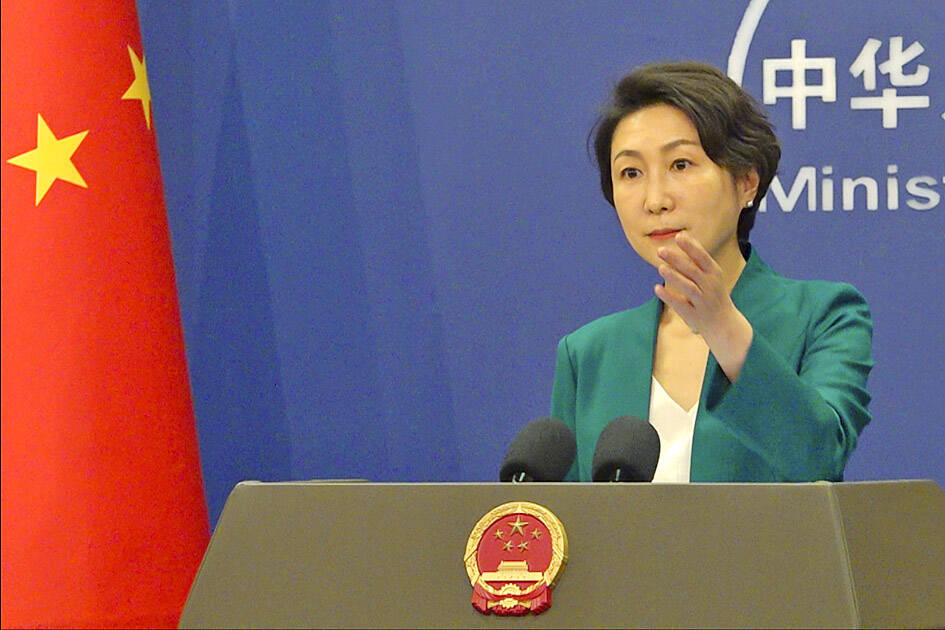The world’s poorest nations face a “tidal wave of debt” as repayments to China hit record highs this year, an Australian think tank said in a new report yesterday.
China’s Belt and Road Initiative lending spree of the 2010s has paid for ports, railways, roads and more from the deserts of Africa to the tropical South Pacific, but new lending is drying up, according to Australia’s Lowy Institute, and is now outweighed by the debts that developing nations must pay back.
“Developing countries are grappling with a tidal wave of debt repayments and interest costs to China,” researcher Riley Duke said. “Now, and for the rest of this decade, China will be more debt collector than banker to the developing world.”

Photo: AP
The Chinese Ministry of Foreign Affairs said that it was “not aware of the specifics” of the report, but that “China’s investment and financing cooperation with developing countries abides by international conventions.”
Ministry spokeswoman Mao Ning (毛寧) said “a small number of countries” sought to blame Beijing for miring developing nations in debt, but that “falsehoods cannot cover up the truth.”
The Lowy Institute sifted through World Bank data to calculate developing nations’ repayment obligations. It found that the poorest 75 countries were set to make “record high debt repayments” to China this year of a combined US$22 billion.
“As a result, China’s net lending position has shifted rapidly,” Duke said. “Moving from being a net provider of financing — where it lent more than it received in repayments — to a net drain, with repayments now exceeding loan disbursements.”
Paying off debts was starting to jeopardize spending on hospitals, schools and climate change, the Lowy report found.
“Pressure from Chinese state lending, along with surging repayments to a range of international private creditors, is putting enormous financial strain on developing economies,” it said.
The report also raised questions about whether China could seek to parlay the debts for “geopolitical leverage,” especially after the US slashed foreign aid.
While Chinese lending was falling almost across the board, the report said there were two areas that seemed to be bucking the trend.
The first was in nations such as Honduras and the Solomon Islands, which received massive new loans after switching diplomatic recognition from Taiwan to China.
The other was in countries such as Indonesia or Brazil, where China has signed new loan deals to secure battery metals or other critical minerals.

Rainfall is expected to become more widespread and persistent across central and southern Taiwan over the next few days, with the effects of the weather patterns becoming most prominent between last night and tomorrow, the Central Weather Administration (CWA) said yesterday. Independent meteorologist Daniel Wu (吳德榮) said that based on the latest forecast models of the combination of a low-pressure system and southwesterly winds, rainfall and flooding are expected to continue in central and southern Taiwan from today to Sunday. The CWA also warned of flash floods, thunder and lightning, and strong gusts in these areas, as well as landslides and fallen

WAITING GAME: The US has so far only offered a ‘best rate tariff,’ which officials assume is about 15 percent, the same as Japan, a person familiar with the matter said Taiwan and the US have completed “technical consultations” regarding tariffs and a finalized rate is expected to be released soon, Executive Yuan spokeswoman Michelle Lee (李慧芝) told a news conference yesterday, as a 90-day pause on US President Donald Trump’s “reciprocal” tariffs is set to expire today. The two countries have reached a “certain degree of consensus” on issues such as tariffs, nontariff trade barriers, trade facilitation, supply chain resilience and economic security, Lee said. They also discussed opportunities for cooperation, investment and procurement, she said. A joint statement is still being negotiated and would be released once the US government has made

SOUTH CHINA SEA? The Philippine president spoke of adding more classrooms and power plants, while skipping tensions with China over disputed areas Philippine President Ferdinand Marcos Jr yesterday blasted “useless and crumbling” flood control projects in a state of the nation address that focused on domestic issues after a months-long feud with his vice president. Addressing a joint session of congress after days of rain that left at least 31 dead, Marcos repeated his recent warning that the nation faced a climate change-driven “new normal,” while pledging to investigate publicly funded projects that had failed. “Let’s not pretend, the people know that these projects can breed corruption. Kickbacks ... for the boys,” he said, citing houses that were “swept away” by the floods. “Someone has

‘CRUDE’: The potential countermeasure is in response to South Africa renaming Taiwan’s representative offices and the insistence that it move out of Pretoria Taiwan is considering banning exports of semiconductors to South Africa after the latter unilaterally downgraded and changed the names of Taiwan’s two representative offices, the Ministry of Foreign Affairs (MOFA) said yesterday. On Monday last week, the South African Department of International Relations and Cooperation unilaterally released a statement saying that, as of April 1, the Taipei Liaison Offices in Pretoria and Cape Town had been renamed the “Taipei Commercial Office in Johannesburg” and the “Taipei Commercial Office in Cape Town.” Citing UN General Assembly Resolution 2758, it said that South Africa “recognizes the People’s Republic of China (PRC) as the sole